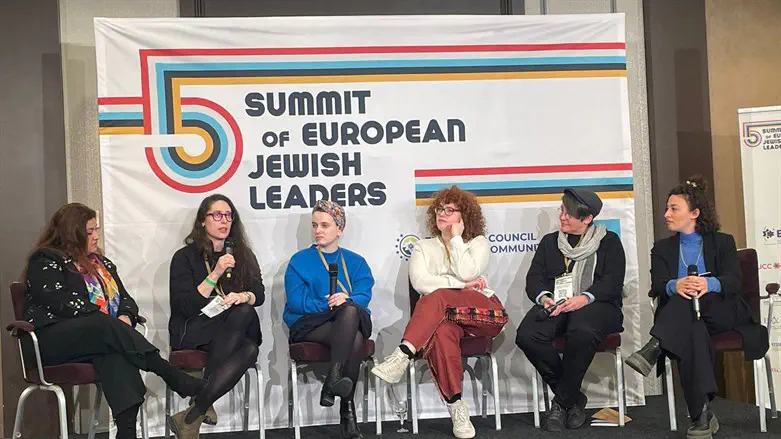
(JTA) — Novelist Ruby Namdar’s appearance at a major conference of European Jewish leaders wasn’t meant to include a speech to an empty chair. But there he was on Sunday night, addressing the chair he had thought would hold Amichai Chikli, Israel’s minister for Diaspora affairs.
Chikli had been scheduled to address the summit, organized by the American Jewish Joint Distribution Committee and the European Council of Jewish Communities, but arrived too late to speak and left early Monday, amid a political crisis in Israel.
“In Israel right now under this government… our house has become rotten and corrupt,” Namdar told cheering conference attendees. “We have lost all shame in Israeli politics. It must be restored.”
Namdar, an Israeli who lives in the United States, told the Jewish Telegraphic Agency that he spoke out because he worried that others at the conference would not.
“A large part of the Jewish leaders of the world and of Europe are here, and I know that many of them, if not most, are very concerned, very worried, feel very alienated,” he said. “But they’re not able to voice it because they’re instinctively so used to supporting Israel, even though it has become harder and harder with every passing year.”
The episode reflected the degree to which Israel’s political crisis is affecting Jews abroad, even reshaping what is discussed during convenings meant to elevate Diaspora Jewish life. On Monday, the saga took a sharp turn, after a protest movement forced Prime Minister Benjamin Netanyahu to delay controversial proposed reforms to the country’s judicial system.
It was the fifth edition of the summit and the first one held in person since the pandemic hit three years ago. The gathering included leaders and Jewish professionals from 35 communities across Europe and covered a broad range of topics, from how to combat antisemitism to how European Jewish communities have responded to Russia’s war against Ukraine; from gender issues to the challenges of “creating Judaism with no synagogues.”
Rates of emigration to Israel from parts of Europe have been high in recent decades, in the wake of the Ukraine war, the rise of right-wing populism and several violent antisemitic attacks by Muslim extremists and neo-Nazis. But some attendees at the conference said the recent crisis there was shaking the sense of safety that many European Jews associate with Israel.
“Democracy is a very important part in our lives especially as young leaders because we have been preached that it is such an important dogma,” Joelle Abaew, a German-Jewish teenager and member of the youth group BBYO’s international board, told JTA. “When, especially as young Jews, most of us identify with our homeland in Israel and if we don’t see that [strong democracy] there, we might question: Is that even our homeland, can we even identify with what they are doing?”
Jonathan Marcus, who is active in several Jewish organizations in Berlin, said he had seen people moving back from Israel to Germany in recent months “because of the current climate,” reflecting a trend of left-wing Israelis considering emigration in response to the judicial reform. He also said he was worried about the religious agenda that some in Israel’s right-wing government want to advance — doing so in the language most often used to describe concerns about religious law in Europe.
“I worry on a personal level: What can I do to make sure we don’t wake up in a Jewish mullah regime?” Marcus said. “Will Israel be where my family and friends live, and be a part of my life?”
Namdar was not the only one to speak out against Chikli. A protest like the ones that have taken place across Israel and the Diaspora took place outside the conference venue, the Hilton Berlin. Inside the hotel’s dining room where Chikli was due to speak, conference guests found fliers distributed clandestinely on each table announcing that hosting him was “a slap in the face of hundreds of thousands of Israelis defending democracy for us too.”
Alexander Oscar, president of Shalom, Bulgaria’s main Jewish umbrella group, said at previous conferences he has attended it would have been unheard of to aim such statements at Israeli government officials. He said that though many European leaders are not Israeli citizens, “we all have our families in Israel and consider the state of Israel our homeland.”
“This is the first time ever I have seen this in conferences with other, you know, other countries, but never for the State of Israel.” Oscar said. “And it makes me happy, because what it says is that Israel is a democracy, and that it has a strong civil society.”
The protesting dovetails with a widening gulf he says that he and other Jewish communities in Central and Eastern Europe are finding with Israel.
“Over the past several years, we are seeing how, in various ways, the State of Israel is actually more prone to supporting the individual states in Europe, sacrificing the interests of the local Jewish communities,” Oscar said. “I’m speaking, in particular, about countries like Poland, like Hungary and Bulgaria nowadays. The local Jewish community is fighting with different groups, and even with the authorities, in terms of preventing the Holocaust distortion, and also combating antisemitism.”
“So we are ending up when the State of Israel is not defending the Jewish communities, in areas where until five, six years ago, it would have been impossible even to think of,” he added.